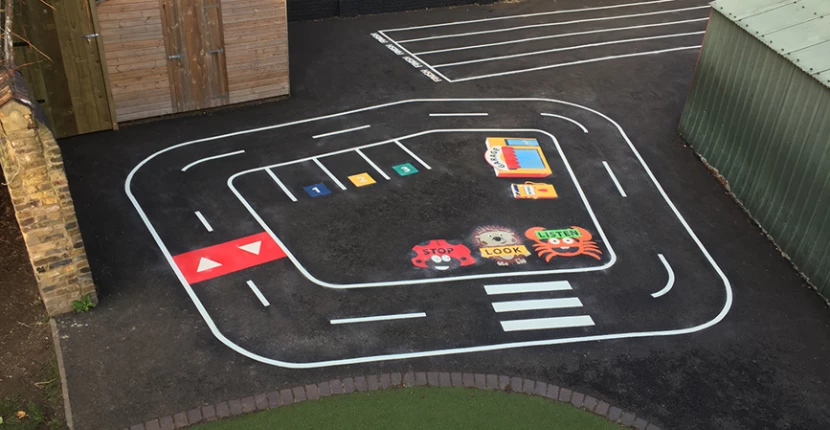
Road Safety Playground Markings in Lincolnshire
Contact UsOur company specialises in designing and installing high-quality thermoplastic road safety markings in Lincolnshire, tailored for schools and nursery playgrounds.
Our innovative solutions enhance safety, support learning, and promote active play through vibrant, durable designs.
From pedestrian crossings to mini-road systems, we combine functionality with creativity to create engaging environments where children can learn vital traffic awareness and safety skills.
Get in touch today for a free, no-obligation quote.
What are Road Safety Playground Markings?
Road safety playground markings in Lincolnshire are ground-based designs replicating traffic systems to teach children about road safety through play.
These thermoplastic playground markings often include realistic elements such as roads, pedestrian crossings, roundabouts, and parking bays, simulating an urban or suburban environment.
Engaging children in role-playing activities as drivers, cyclists, or pedestrians offers a practical and interactive way to learn traffic rules and safety behaviours.
They are typically installed in schools, parks, and community centres, providing a safe and controlled setting for traffic education.
What Types of Road Safety Markings are Available for Playgrounds?
Road safety markings for playgrounds in Lincolnshire are designed to create safe, engaging, and educational environments for children.
These playground markings mimic real-world road systems or provide imaginative play options, helping children learn traffic rules and fostering physical and cognitive development.
Mini Road Systems: Mini-road systems replicate streets with lanes, pedestrian crossings, and roundabouts. These systems help children understand traffic navigation and pedestrian safety rules through role-playing.
Pedestrian Crossings: Pedestrian crossings, such as zebra crossings, teach children how to cross roads safely. They can also serve as starting points for traffic safety discussions and games.
Traffic Signs and Signals: Markings accompanied by traffic signs or light symbols introduce children to standard road instructions. This combination improves recognition and understanding of safety protocols.
Cycling Tracks: Dedicated cycle paths with arrows and lane markings simulate real cycling lanes. These tracks encourage safe cycling practices and develop balance and coordination.
Parking Bays: Parking bay markings allow children to role-play parking scenarios with toy vehicles. They also help improve spatial awareness and planning skills.
Hopscotch and Game Markings: While not directly road-related, hopscotch and similar games often incorporate directional arrows. These markings merge play with learning, introducing basic navigational concepts.
Playground road safety markings in Lincolnshire offer versatile options to combine fun with foundational life skills, ensuring an engaging and safe learning experience for children.
How much do Road Safety Playground Markings Cost?
The average cost of road safety playground markings is £600 - £2,500.
The cost of installing thermoplastic road safety playground markings in Lincolnshire varies depending on the design's size, complexity, and customisation.
What are the Benefits of Road Safety Playground Markings?
Road safety playground markings in Lincolnshire provide an interactive and educational way for children to learn about traffic rules, pedestrian awareness, and cycling safety in a safe and controlled environment. These markings help develop road awareness skills from an early age while promoting physical activity and imaginative play.
Teaches Road Safety Skills: Road layouts, zebra crossings, stop signs, and traffic lights help children understand real-world road rules, improving their awareness of pedestrian and cycling safety.
Encourages Safe Cycling & Scooting: Marked lanes and road systems allow children to practice using bikes, scooters, and ride-on toys, helping them learn road positioning and safe movement.
Promotes Interactive & Imaginative Play: Children can role-play as drivers, pedestrians, or traffic controllers, making learning about road safety an engaging and enjoyable experience.
Improves Decision-Making & Awareness: By interacting with crossings, signals, and road markings, children develop better judgement and quick-thinking skills in simulated traffic scenarios.
Supports Early Learning & Education: Schools can use road safety markings as a practical learning tool, helping to reinforce lessons about crossing roads, understanding traffic signals, and general road awareness.
Creates a Safe Learning Environment: These markings provide a realistic road experience without the risks of actual traffic, allowing children to practice safely before encountering real roads.
Durable & Low Maintenance: Made from thermoplastic, these markings are long-lasting, weather-resistant, and require minimal upkeep, ensuring they remain clear and functional for years.
By incorporating road safety playground markings, schools and community spaces in Lincolnshire can help children develop essential life skills, encourage active outdoor play, and promote road awareness from an early age.
Can Road Safety Markings be Customised for Specific Educational Needs?
Road safety markings can be customised for specific educational needs.
Customisation options allow road safety markings to meet specific educational goals or reflect a community's unique needs.
Thermoplastic markings in Lincolnshire can include traffic signs and symbols relevant to the local area or laws. Educational games, such as quizzes or challenges integrated into the design, can enhance learning opportunities.
Schools or organisations can add logos or branding elements to personalise the markings. Inclusive features, such as paths for wheelchairs or sensory aspects for children with disabilities, can be incorporated to ensure accessibility for all users.
Other Services We Offer
We cover Lincolnshire
